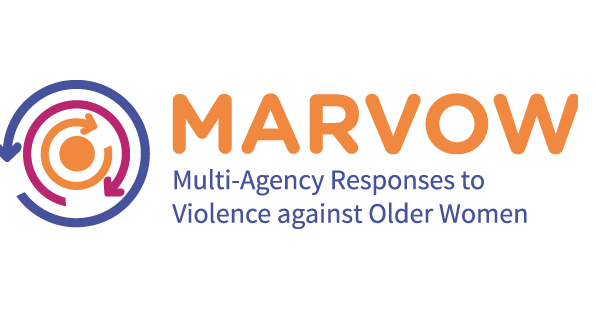Violence against older women is a tremendous issue, which is steadily increasing around Europe. However, often the necessary socio-political discussion about it is missing. COVID-19 has also enormously intensified and aggravated the situation.
The WAVE Network, together with five other partners, worked on the MARVOW Project to improve the support to older women survivors of violence through multiagency cooperation.
Gender-based violence against women is a big taboo
Older women are often confronted with various forms of violence and neglect – physical, psychological, sexual, and social. It is a form of violence that is highly taboo and often not visible enough and therefore hardly considered. Older people encounter many barriers that make it much less likely that the violence will be recognised, reported, and stopped.
The MARVOW Project aimed to raise awareness and ensure that older survivors of violence are recognised and receive the support they need. Older women are usually at higher risk of violence, not only because of their age but also because of their gender. Furthermore, they are often exposed to lifelong (structural) disadvantages and affected by many dependencies, all factors that prevent them from reporting the abuse to the relevant authorities and support services.[1]
What has been done?
The MARVOW Project started in 2019 to establish multi-institutional platforms in three countries Austria, Estonia and Greece. Workshops and trainings were held with all relevant stakeholders such as women’s shelters, counselling centres, victims’ support services, care services, social workers, health services, police and men’s counselling centres. In regular steering meetings, the gaps and shortcomings in the respective regions were discussed, a unified stance against gender-based violence against older women was developed and perpetrator-related and effective measures against perpetrators of violence were developed. Case conferences served to provide concrete support to older women at risk. Tools for risk assessment were presented in order to sustainably create an improved infrastructure for survivors of violence.
More than 300 interested people participated in the MARVOW Project. 32 case studies were discussed, illustrating the complex and multiple dimensions that violence against older women can cause. These case studies were used in the 71 MARVOW multi-agency meetings that took place in total to find answers and solutions. Many gaps in the system were identified, but concrete solutions were also proposed.
The project evaluation found that 75% of the professionals working in MARVOW have never or rarely participated in professional training on violence against older women. The majority of professionals stated that they do not have or have never used formal protocols and guidelines when providing services to older women. The same observation was made in MARVOW’s predecessor project – WHOSEFVA – where 96.9% of 327 professionals reported that they had ‘never’ or ‘rarely’ attended training on violence against older women. However, after attending the MARVOW meetings, participants reported a higher rate of recognition of older women survivors in their daily practice and the use of a systematic approach in their work in identifying older women affected by violence.
Building and maintaining multi-institutional cooperation and platforms also require financial resources in order to work together effectively and in the long term.
MARVOW, therefore, urges politicians and society to increasingly address the many forms and effects of human rights violations and violence against older people, especially against older women, and to take concrete measures and offer help. It is also a matter of imparting knowledge and thus creating and raising awareness about violence against older people.[2]
***
Follow MARVOW’s Facebook page and website for information about our upcoming activities and don’t hesitate to get in touch with the project partners if you have any further questions!
Project partners in Austria, Greece, Estonia and Germany:
Austrian Women’s Shelter Network and Information Centre Against Violence | Autonome Österreichische Frauenhäuser (AÖF), Austria, Maria Rösslhumer, maria.roesslhumer@aoef.at (project lead)
Union of Women Associations of Heraklion Prefecture (UWAH) | Σύνδεσμος Μελών Γυναικείων Σωματείων Ηρακλείου, Greece, Nicholas Spetsidis, projects@kakopoiisi.gr
Women’s Support and Information Centre (WSIC) | Naiste Tugi- ja Teabekeskus, Estonia, Pille Tsopp-Pagan, pille.tsopp-pagan@naistetugi.ee
University of Tartu, Estonia, Hector Pagan, hector@ut.ee
European Network for the Work with Perpetrators of Domestic Violence (WWP EN), Dimitra Mintsidis, d.mintsidis@work-with-perpetrators.eu
Women Against Violence Europe (WAVE Network), Elena Floriani, elena.floriani@wave-network.org
[1] World Health Organization (2017), Elder Abuse Factsheet, www.who.int/mediacentre/factsheets/fs357/en/













